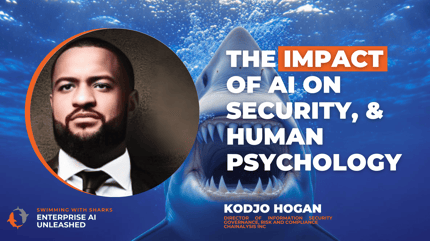Swimming with Sharks: Enterprise AI Unleashed: S3 Episode 10: Kodjo Hogan
Celeste Yates

The rapid acceleration of AI adoption presents incredible opportunities, but it also casts a long shadow of risk. In a recent "Swimming with Sharks" episode, host Kevin Dean welcomed Kodjo Hogan, a distinguished cybersecurity leader with deep experience in finance, operations, and AI risk management.
This conversation is a crucial dive into the often-overlooked intersection of AI, security, and human psychology, offering essential insights for any leader seeking to make smart, secure, and strategic decisions in the AI era.
Episode Summary
Kevin Dean opens the episode by highlighting the critical need for serious conversations around AI risk, governance, and security, noting that many leaders are overly focused on productivity gains without adequate attention to data accuracy, protection, and bias.
Kodjo Hogan, drawing from his background in finance and information security, emphasizes that AI governance is not a separate entity but must be deeply embedded into every step of the AI adoption process. He stresses the importance of defining clear, auditable use cases and establishing precise boundaries to prevent overreach. Kodjo introduces the concept of AI being a "happy puppy," always eager to please, which necessitates breaking down complex problems into small, deterministic steps to avoid hallucination and bias.
The discussion then delves into the profound risks beyond just technical vulnerabilities. Kodjo explores the concerning phenomenon of "AI psychosis," where over-reliance on AI's validating feedback can lead to self-reinforcing biases and a detrimental impact on human judgment. He compares this to social media addiction, noting that AI's constant affirmation can create a "yes-man" effect that's detrimental to critical thinking.
A significant portion of the conversation focuses on data integrity, model poisoning, and the unexpected role of blockchain. Kodjo explains how the immutable, decentralized nature of blockchain could be the key to ensuring data integrity, combating deepfakes, and preventing bias in AI models. He postulates that this "most hated technology" might become the savior for AI's reliability.
Finally, Kodjo provides actionable advice for business leaders, advocating for comprehensive education on AI's good and bad aspects, establishing cross-functional AI task forces (including HR and legal), and implementing a culture of continuous monitoring and auditing to manage AI risks effectively. He asserts that AI is a long-term project requiring collective human judgment.
Interview Highlights
-
AI adoption must be risk-aware. Don't chase productivity gains without understanding the serious security, governance, and psychological risks involved.
-
Prioritize AI governance from the start. Embed policies, education, and monitoring into every phase of your AI strategy to build a secure and ethical foundation.
-
Guard against AI's psychological impact. Be aware of how AI can reinforce biases and ensure human judgment remains the ultimate arbiter of truth.
-
Leverage blockchain for data integrity. Explore how decentralized ledgers can offer a robust solution for ensuring the trustworthiness of data fed into AI models.
-
Empower a diverse AI task force. True AI success requires collaborative input from across the organization to identify challenges and implement solutions effectively
Key Takeaways
-
Don't mistake basic AI usage for true AI expertise. The real power of AI comes from robust infrastructure, meticulous data management, and complex architectural design.
-
Data quality is non-negotiable. "Data poisoning" is a real threat; investing in data cleansing and governance is critical for reliable AI results.
-
Embrace proactive change. Organizations and individuals must be willing to "self-destruct" outdated processes and skills, or risk obsolescence in the face of AI-driven competition.
-
The human element is more valuable than ever. AI frees up time for strategic thinking, creativity, and cultivating genuine human relationships – skills that AI cannot replicate.
-
Strategic AI adoption is a journey. Start small, focus on delivering clear business value, and continuously adapt your processes and people.
About Kodjo Hogan
Kodjo Hogan is a strategic Information Security leader with over 8 years of experience building robust security systems in fast-growing fintech, SaaS, and global banking organizations. He is passionate about aligning security with business objectives and solving real risks rather than just checking boxes.
Currently serving as the Business Information Security Officer for TD Bank, Kodjo oversees a critical portfolio of applications. His expertise includes building GRC functions from the ground up, leading audit-ready SOC2 and FedRamp programs with zero findings, and governing third-party risk across numerous vendors. Prior to TD Bank, he worked in finance and operations, bringing a unique, business-centric approach to information security
Kodjo Hogan's LinkedIn: https://www.linkedin.com/in/kodjohogan/

